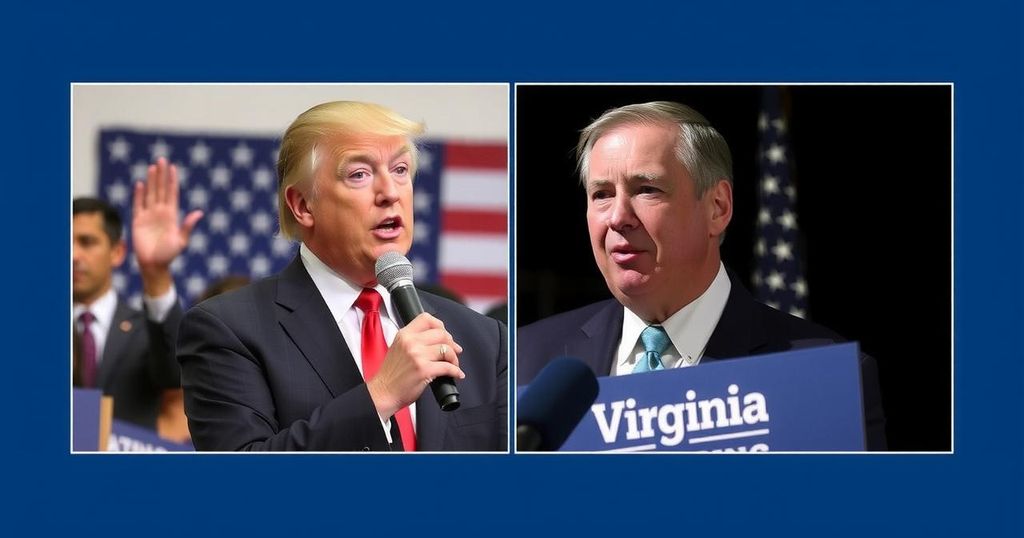Virginia’s Special Elections: A Crucial Test Ahead of 2025 Gubernatorial Race

Tuesday’s special elections in Virginia aim to assess public sentiment before the 2025 gubernatorial race. Key contests include Democratic incumbents Kannan Srinivasan and J.J. Singh defending their seats against Republican challengers, while Jack Trammell faces GOP nominee Luther Cifers in a Republican-leaning district. The elections highlight critical issues such as reproductive rights and a significant budget surplus, impacting legislative priorities.
The special elections in Virginia, scheduled for Tuesday, are significant as they will gauge public sentiment ahead of the state’s crucial 2025 gubernatorial race. These elections serve as a litmus test for both major parties, with the potential to solidify Democratic control in the General Assembly or signal a shift towards Republican influence. Notably, the contests will involve two Democratic incumbents striving to retain their seats against Republican challengers, drawing nationwide attention.
In the 32nd Senate District, Democratic Delegate Kannan Srinivasan seeks election against Republican Tumay Harding, following the vacating of a seat due to U.S. Rep.-elect Suhas Subramanyam’s ascension to Congress. In the 26th House District, Democrat J.J. Singh competes against Republican Ram Venkatachalam for Srinivasan’s former seat. Both of these key races have attracted national interest due to their implications for the Democratic Legislative Campaign Committee’s efforts.
The 10th Senate District race features Democrat Jack Trammell against Republican Luther Cifers, who is favored due to the district’s Republican leanings. In previous elections, over 60% of the district’s voters supported Donald Trump, while almost 70% backed Governor Glenn Youngkin. The presence of a $2 billion budget surplus adds another layer of complexity, as lawmakers debate potential allocations, with Democrats focusing on K-12 education and both parties considering tax relief for workers.
Abortion rights have emerged as a critical issue within these elections, especially with the recent national discourse surrounding it. Democratic candidates have affirmed their commitment to protecting access to abortion, while their Republican counterparts have been less definitive in their positions. The political atmosphere surrounding reproductive rights is expected to play a significant role in these elections, particularly with the potential to influence future legislative agendas, including a proposed constitutional amendment aimed at safeguarding abortion rights in Virginia.
The abortion debate has not only encapsulated partisan divides but it has also been a reflection of broader national conversations following the U.S. Supreme Court’s decision to overturn federal protections in 2022. With the political landscape poised for changes under a new Republican presidency, the outcomes of these elections could dictate the direction of legislative actions concerning abortion in the state.
These special elections in Virginia represent an important early indication of voter attitudes as the state gears up for the high-stakes 2025 gubernatorial race. As Republicans gain momentum nationally and anticipate greater control over government avenues, the electoral outcomes may either reinforce or challenge Democratic dominance in Virginia’s General Assembly. Not only do these contests involve critical legislative seats, but they also touch on vital issues like budget allocation, education funding, and reproductive rights that resonate strongly with the electorate. Additionally, the environment surrounding reproductive rights has become increasingly contentious as abortion has evolved into a key political issue following the Supreme Court’s 2022 decision to revoke federal protections, making these elections particularly notable in the context of Virginia’s legislative priorities.
In sum, the upcoming special elections in Virginia will serve as a pivotal moment for both the Democratic and Republican parties as they approach the 2025 gubernatorial race. With critical issues such as budget allocations and reproductive rights at stake, the voter response could significantly shape the political landscape in Virginia. Whether these elections bolster Democratic dominance or signal a shift in favor of Republican endeavors will not only influence local governance but may also reflect national trends in voter sentiment and party loyalty. Ultimately, the outcomes could establish a foundation for future legislative frameworks, especially regarding abortion and education policies.
Original Source: dailyprogress.com







